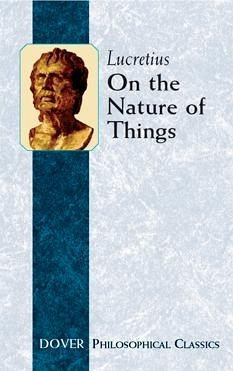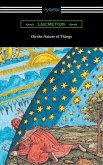A Roman poet and philosopher of the first century, Lucretius sought to dispel what he considered the chief cause of unhappiness: fear of death and fear of the wrath of the gods. His great didactic poem in six parts, De Rerum Natura (On the Nature of Things), theorizes that natural causes are the forces behind earthly phenomena and dismisses the concept of divine intervention.
Lucretius' discourse ranges from discussions of the motion of atoms, natural phenomena, and sensation, to assertions regarding free will and the soul's relationship to the body. He maintains that the soul is a chance combination of atoms that perishes with the body, rather than a distinct, immaterial entity. The philosopher proposes completely natural causes for all earthly phenomena, suggesting that the world operates independently of divine agency and that fear of the supernatural is unfounded. Although he refrains from denying the existence of gods, Lucretius considers them unconcerned with human affairs and destiny.
Derived from the philosophical materialism of the Greeks, Lucretius' writings remain the primary source for contemporary knowledge of Epicurean thought. A staple of introductory philosophy courses, this volume is also a masterpiece of Latin verse.
Lucretius' discourse ranges from discussions of the motion of atoms, natural phenomena, and sensation, to assertions regarding free will and the soul's relationship to the body. He maintains that the soul is a chance combination of atoms that perishes with the body, rather than a distinct, immaterial entity. The philosopher proposes completely natural causes for all earthly phenomena, suggesting that the world operates independently of divine agency and that fear of the supernatural is unfounded. Although he refrains from denying the existence of gods, Lucretius considers them unconcerned with human affairs and destiny.
Derived from the philosophical materialism of the Greeks, Lucretius' writings remain the primary source for contemporary knowledge of Epicurean thought. A staple of introductory philosophy courses, this volume is also a masterpiece of Latin verse.
Dieser Download kann aus rechtlichen Gründen nur mit Rechnungsadresse in A, D ausgeliefert werden.
Es gelten unsere Allgemeinen Geschäftsbedingungen: www.buecher.de/agb
Impressum
www.buecher.de ist ein Internetauftritt der buecher.de internetstores GmbH
Geschäftsführung: Monica Sawhney | Roland Kölbl | Günter Hilger
Sitz der Gesellschaft: Batheyer Straße 115 - 117, 58099 Hagen
Postanschrift: Bürgermeister-Wegele-Str. 12, 86167 Augsburg
Amtsgericht Hagen HRB 13257
Steuernummer: 321/5800/1497
USt-IdNr: DE450055826
Bitte wählen Sie Ihr Anliegen aus.
Rechnungen
Retourenschein anfordern
Bestellstatus
Storno









